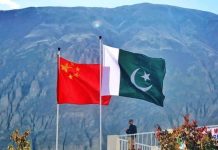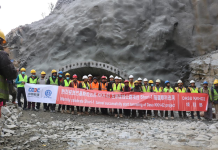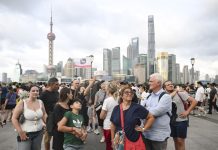
As the annual sessions of the National People’s Congress (NPC), China’s top legislature, and the National Committee of the Chinese People’s Political Consultative Conference (CPPCC), the top advisory body, are currently underway, Beijing Review presents the stories of several NPC deputies and CPPCC National Committee members. We hope these reports help readers understand who they are and how they work for the nation.
Since taking charge of Lizu Village in Yiwu, Zhejiang Province in 2017, Fang Haolong has been working hard to improve it. A variety of measures have been taken, such as creating a clean environment, developing local industries, attracting professional personnel and promoting tourism.
“Ensuring a nicer place for villagers to live and for tourists to visit, as well as a well-off life for residents has been a long-cherished goal of mine,” Fang, Director of the Lizu Villagers’ Committee, also Secretary of the village’s Communist Party of China (CPC) branch, told Beijing Review.
A makeover
Its remoteness and inaccessibility once made Lizu a poverty-stricken village well-known for being “dirty, messy and backward.”
Then, in June 2003, Zhejiang provincial authorities launched the Thousand Villages Demonstration and Ten Thousand Villages Renovation Project, also known as the Green Rural Revival Program, with the aim to renovate 10,000 administrative villages in the province and transform 1,000 of them into models of moderate prosperity. For 20 years, the project has turned thousands of villages into beautiful places and changed the face of the province’s countryside.
Under the project, Lizu began rehabilitating its environment by tackling challenges in sewage and solid waste disposal, and by upgrading roads and rural toilets.
In 2005, the village was selected to be one of the project’s demonstration villages. Fang, a member of the village Party branch at that time, was always willing to take on any tiring or dirty work, including wading through the mud of a fetid roadside ditch to remove rubbish, and helping farmers clean up piles of refuse that had accumulated in front of and behind their houses. “The project is such a good opportunity for change, so village officials must take the lead and contribute more to the village,” Fang said.
All his efforts were witnessed by his fellow villagers. In 2017, they elected him secretary of the village Party branch. By that time, though he had received an invitation to work at a company in the city with a handsome income, he didn’t accept. Some villagers felt it was a pity that he gave up the opportunity and instead became a farmer with his legs covered with mud. “I just want to do more for the village,” Fang said.
Over the years, Fang has led infrastructure improvements to the entire village, including building a cultural center, a senior care center, a laundry room, a garbage treatment facility and a square equipped with colorful lights for villagers to congregate in.
As a deputy to the 14th National People’s Congress (NPC), China’s top legislature, Fang undertakes the important responsibility of representing the people, and the public interest is his top priority. In the course of his work, he frequently visits villagers’ homes, farmlands and business centers to learn about their work and concerns and seek their suggestions. The passenger seat beside him in his car is piled up with the documents he needs for reference. “As I’m always in between places, the car is like my office,” he said.
Every year, the NPC, the highest state organ of power, and the National Committee of the Chinese People’s Political Consultative Conference, the top political advisory body, hold full sessions to deliberate matters relevant to the country’s development. These two sessions are usually convened in early March.
The current NPC has some 3,000 deputies, elected by the country’s provinces, autonomous regions, municipalities, special administrative regions and armed forces. Of them, about 16.69 percent are frontline workers and farmers, and 32.55 percent are Party and government officials.
The role of NPC deputies includes regularly carrying out field research to gain understanding of economic and social development, and to collect public opinion. Based on this insight, they formulate suggestions, which they then submit to the NPC. Government agencies are obligated to consider these suggestions and give feedback, and deputies then review this feedback and confirm whether or not it is satisfactory. As legislators, deputies can also propose motions on making, amending and interpreting laws.
Last year, during the First Session of the 14th NPC, which opened in Beijing on March 5, 2023, Fang proposed suggestions mainly concerning rural economic development. At this year’s NPC session, he is making more suggestions for improving villages, based on his observation and investigation. These include encouraging adjacent villages to cooperate with each other by drawing on their respective strengths for common development.
Boosting industries
Under the Thousand Villages Demonstration and Ten Thousand Villages Renovation Project, new forms of business, including rural tourism, ecological agriculture and rural e-commerce have been booming in Zhejiang, allowing rural people to live a well-off life without sacrificing the natural environment.
Lizu is located near the Yiwu International Trade Market in Yiwu, which is dubbed “the world’s supermarket” for its large variety of commodities, convenient and fast logistics, and sound business environment. Many villagers, with the help of local authorities, have increased their income by taking advantage of this location and engaging in e-commerce and livestreaming businesses.
With a constantly improving natural environment and distinctive local culture, Lizu has also become a hot tourist destination. Villagers have opened restaurants, hotels, homestays and shops, adding to their incomes and living standard.
The annual per-capita disposable income of villagers in Lizu increased from less than 5,000 yuan ($694) in 2003 to 60,000 yuan ($8,339) in 2023, and the annual income of the village collective also increased from 11,000 yuan ($1,528) to 3.56 million yuan ($494,825) during the period.
The village’s growing prosperity also comes from its tourism development. More than 700,000 tourists visited the village in 2023.
In 2017, Fang came up with the idea of inviting more people from outside the village to settle and start businesses there. He encouraged the villagers to repair several old empty houses that had been built in the traditional local style and then rented them out at low prices in order to develop industries and increase the popularity of the village.
At present, it is home to more than 200 young business-minded persons, of whom more than half are college students and 80 percent are from outside the village. These young minds are helping Lizu create a more modern vibe by opening businesses new to the area, such as cafés, souvenir stores and hands-on tie-dye workshops. In addition to contributing their innovative ideas, they have also boosted local employment and are attracting increasing numbers of travelers.
Through regular visits, face-to-face communication and other means, Fang and other village officials help these young persons solve problems concerning their business operations including labor disputes, and help them to make use of preferential policies for enterprises.
“We need to further develop distinctive rural industries, which will allow more young people to find their passion and career paths in rural areas. In turn, these young people can be drivers of long-term rural development,” Fang said. –The Daily Mail-Beijing Review news exchange item





